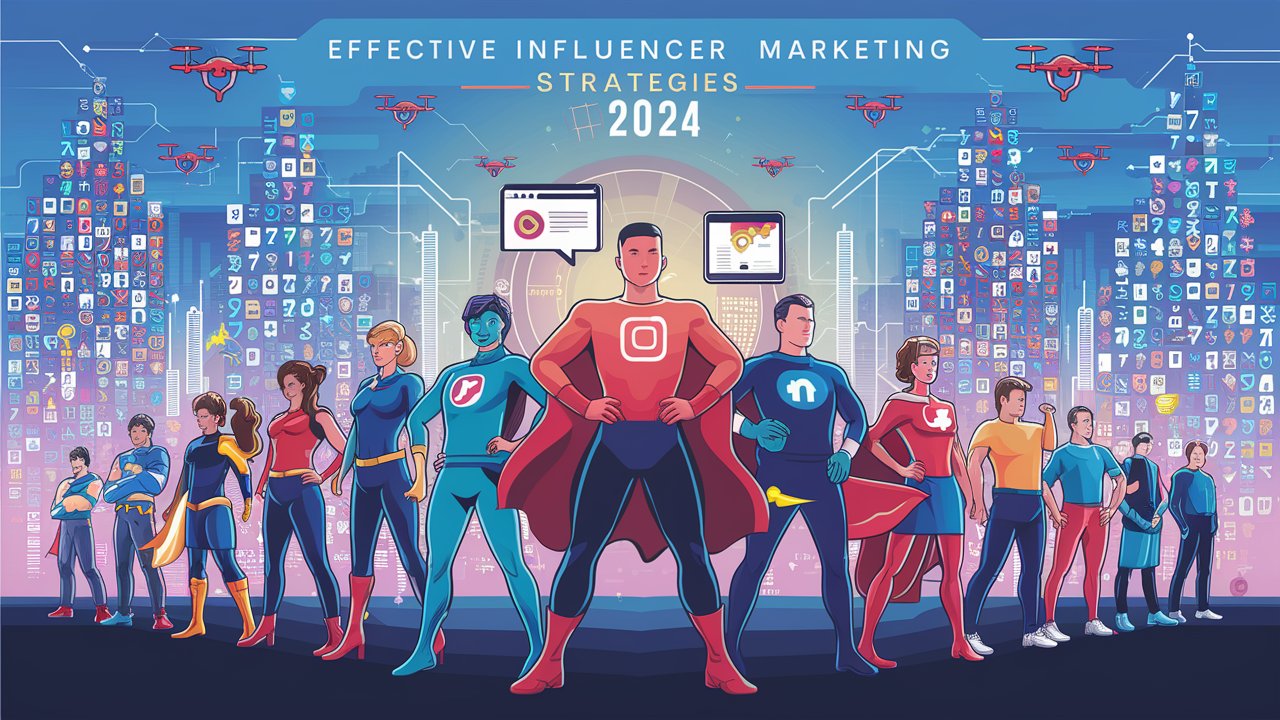- Introduction

Influencer marketing continues to evolve and remains a powerful tool for brands aiming to reach and engage their target audiences. As we move into 2024, understanding the latest strategies and best practices can help businesses maximize the impact of their influencer marketing campaigns. Here are the most effective influencer marketing strategies for 2024:
1. Identify the Right Influencers [Effective Influencer Marketing Strategies for 2024]

The success of your influencer marketing campaign largely depends on choosing the right influencers. Look beyond follower count and focus on engagement rates, authenticity, and relevance to your brand. Use tools and platforms that analyze influencer metrics to find those who align with your brand values and have a genuine connection with their audience. Micro-influencers, with followers ranging from 1,000 to 100,000, often have higher engagement rates and can be more cost-effective than macro-influencers.
2. Build Long-Term Partnerships

Rather than opting for one-off campaigns, build long-term relationships with influencers. Long-term partnerships foster trust and authenticity, making endorsements appear more genuine. These ongoing collaborations allow influencers to integrate your brand into their content naturally, which resonates better with their audience. Consistency in messaging also helps reinforce brand recognition and loyalty over time.
3. Set Clear Goals and KPIs
Before launching any campaign, define clear objectives and key performance indicators (KPIs). Whether it’s increasing brand awareness, driving website traffic, or boosting sales, having specific goals will guide your strategy and help measure success. Common KPIs include engagement rates, reach, impressions, conversions, and return on investment (ROI). Clear goals ensure both you and the influencer are aligned and working towards the same outcomes.
4. Create Authentic Content
Authenticity is crucial in influencer marketing. Allow influencers creative freedom to produce content that feels genuine and aligns with their personal brand. Audiences trust influencers for their authentic voice, and overly scripted or promotional content can backfire. Encourage influencers to share personal stories, experiences, and honest opinions about your products or services. Authentic content is more likely to engage and resonate with the audience.
5. Utilize Multiple Platforms
Diversify your influencer marketing efforts across multiple social media platforms. While Instagram remains a popular choice, consider leveraging YouTube, TikTok, Twitter, and emerging platforms where your target audience is active. Each platform has unique features and user behaviors, so tailor your content strategy accordingly. For example, YouTube is great for long-form content and tutorials, while TikTok excels with short, engaging videos.
6. Leverage User-Generated Content
Encourage influencers to create content that inspires their followers to participate and share their own experiences with your brand. User-generated content (UGC) amplifies your reach and adds an extra layer of authenticity. Run campaigns that involve challenges, contests, or hashtags to motivate followers to generate and share content. Featuring UGC on your brand’s social media channels can also create a sense of community and engagement.
7. Focus on Niche Markets
Niche influencers often have highly engaged and loyal followers. Collaborating with niche influencers allows you to tap into specific communities and target audiences more effectively. These influencers have deep knowledge and passion for their niche, making their endorsements highly credible. Whether it’s fitness, beauty, technology, or gaming, find influencers who specialize in areas relevant to your products or services.
8. Implement Data-Driven Decisions
Use data and analytics to guide your influencer marketing strategies. Track the performance of your campaigns in real-time and analyze metrics to understand what works and what doesn’t. Utilize tools that provide insights into influencer performance, audience demographics, and engagement rates. Data-driven decisions help optimize your campaigns, allocate budgets effectively, and achieve better results.
9. Ensure Compliance and Transparency
Transparency and compliance are critical in influencer marketing. Ensure that all influencer partnerships adhere to advertising guidelines and regulations. Influencers must clearly disclose their relationships with brands to maintain trust and credibility with their audience. Use clear and conspicuous disclosures such as ad or sponsored in all promotional content. Staying compliant not only builds trust but also protects your brand from potential legal issues.
10. Measure and Optimize Campaigns
Continuously measure the performance of your influencer marketing campaigns and make necessary adjustments. Analyze the impact of each campaign against your KPIs and goals. Look at metrics such as engagement rates, click-through rates, conversions, and overall ROI. Gather feedback from influencers and their audiences to gain insights and improve future campaigns. Regular optimization ensures that your influencer marketing efforts remain effective and aligned with your business objectives.
In our comprehensive guide on launching a successful digital marketing agency, we recommend leveraging external resources to enrich your knowledge and stay updated with industry trends. Here are some valuable resources to explore:👇
Conclusion
Influencer marketing in 2024 requires a strategic approach that prioritizes authenticity, long-term partnerships, and data-driven decisions. By identifying the right influencers, setting clear goals, and leveraging multiple platforms, brands can create impactful and engaging campaigns. Focusing on niche markets, encouraging user-generated content, and ensuring compliance further enhance the effectiveness of influencer marketing. Continuous measurement and optimization will help brands stay ahead of the competition and achieve sustained success in their influencer marketing efforts. Adopting these strategies will ensure your influencer marketing campaigns drive meaningful results and contribute to your overall marketing goals.
